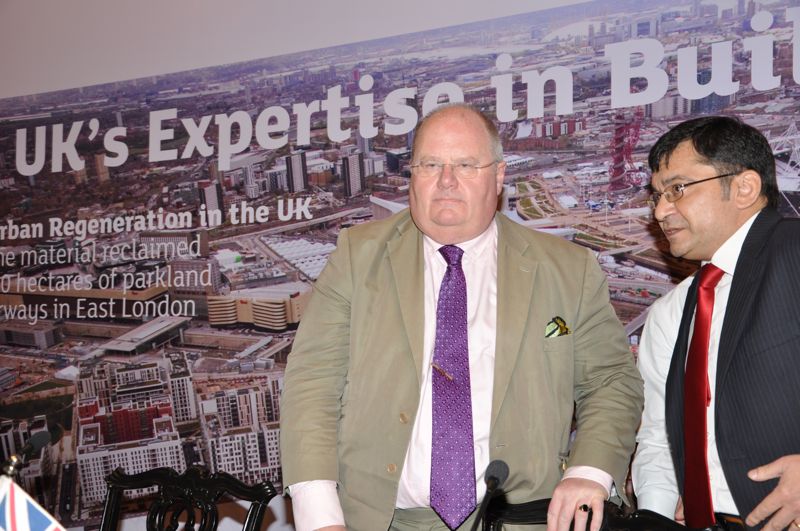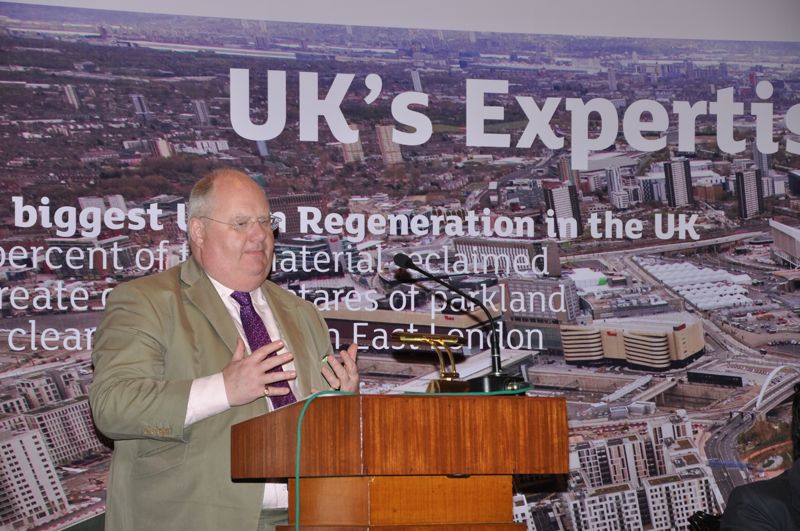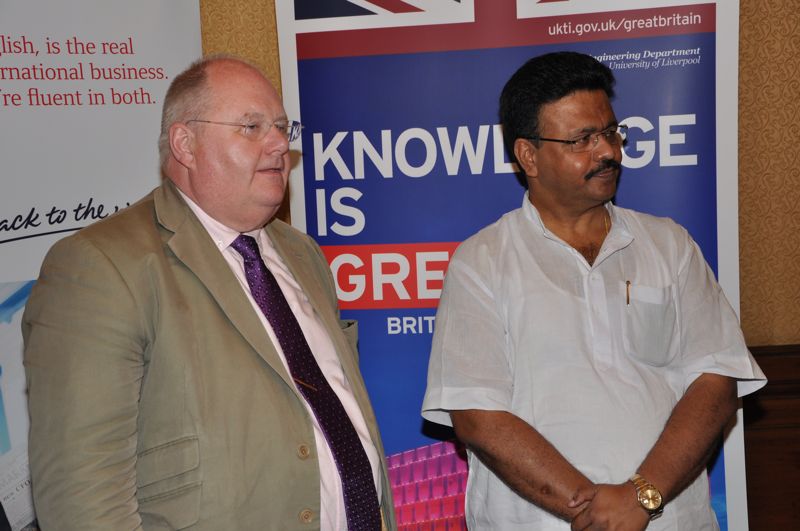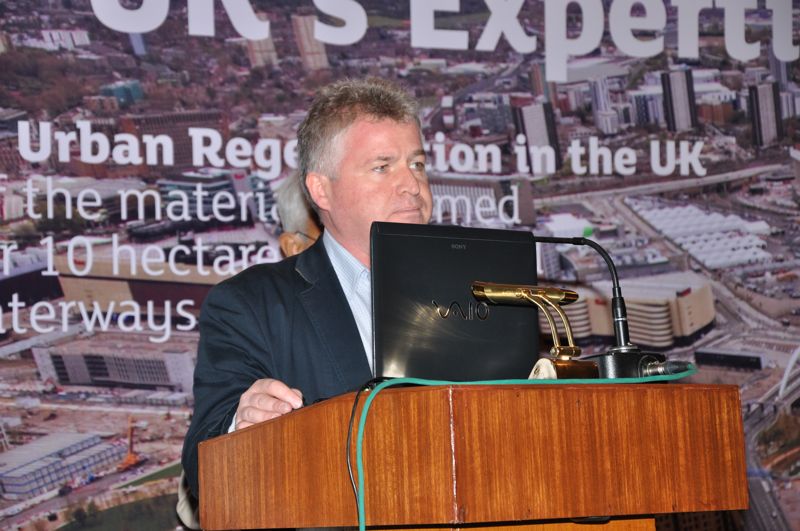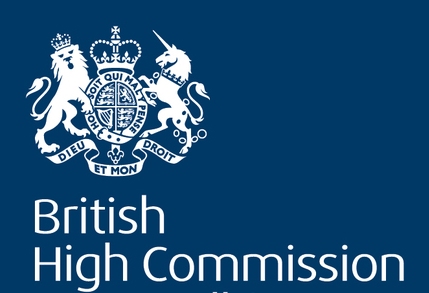 The Rt. Hon. Eric Pickles MP.British Cabinet Minister for Communities and local Government, is leading a 20-member UK business delegation to India from 2 to 7 June 2013. Mr Pickles is visiting Kolkata and Kochi.
The Rt. Hon. Eric Pickles MP.British Cabinet Minister for Communities and local Government, is leading a 20-member UK business delegation to India from 2 to 7 June 2013. Mr Pickles is visiting Kolkata and Kochi.
The accompanying delegation will explore partnerships in the built environment, infrastructure, construction and water sectors.ss
Ahead of his visit, Mr Pickles said
‘’It is a privilege to lead a British business delegation to India is one of the biggest emerging markets in the world and we can be India’s partner of choice. We both agree success will hinge on our ability to put in place the right infrastructure and we are well placed to help India with their plans.
‘’The companies I will be introducing represent the best of British. They not only have world class expertise in big construction projects and urban renewal, but they know how to bring economic growth to different parts of a country.
In Kolkata, Mr. Pickles will meet the state Finance Minister Dr Amit Mitra and Minister of Urban Development Mr Firhad Hakim. He will also address the inaugural session of the seminar on UK Built Environment Expertise.
Mr. Pickles is also visiting the International Institute of Hotel Management which, apart from being a management school, also promotes culinary art as a sustainable vocation. IIHM has been hosting The Young Chef Competition. Mr. Pickles will tour the IIHM complex in Salt Lake and talk to young chefs who are looking at a career in promoting Indian cuisine in the UK.
Mr. Pickles will also visit a community development project in Nadial which engages with young people in the community through sports- Goalz. The project, managed by Premier league, the British Council and Kolkata Police, works with local football clubs for training the youth and uses football as a tool to help develop both community coaching and English language skills. The programme trains aspiring sports coaches and youth leaders to return to their existing football can play in tackling other social issues.
In Kochi, Mr. Pickles will meet the Hon’ble Chief Minister Oommen Chandy and senior representatives from the Kerala Government. He will deliver a speech at a businessseminar hosted by the Indian Green Building Congress (ICGBC)and the Confederation of Indian Industry (CII) to encourage stronger Indo-UK partnership in the infrastructure sector. He will attend events to support the low-carbon development pathway at municipal and local government level.
Highlights of the Speech by the Rt Hon Eric Pickles MP, UK Cabinet Minister for Communities and Local Government, at a Seminar on ‘UK Built Environment Expertise’
INTRODUCTION
There’s a saying that a ‘week is a long time in politics.’’ So any government, such as West Bengal, that has completed two years in power, is worth of its place in history. And let me say also that, as a cricket fan, its fantastic to be here in Kolkata. The home to Eden Gardens, Cricket’s Coliseum.
Surely, one of the top sporting venues in the world. And the stage for some of the most magnificent feats of cricketing history. VSS Laxman’s masterly 281. Harbhajan’s hatrick. The record breaking one-day feats of the princely Sachin, Or dare I say Alistair Cook’s bat breaking century securing that rarest of things- an English test victory in India.
But as Rahul Dravid- the Wall- woulddoubtless say, match winning innings must be built on soild foundations. And it’s the same with the economy. A country seeking to accumulate must rely not simply on peerless technique but on having the right game plan
INDIAN INFRASTRUCTURE
Now when it comes to infrastructure India is truly the land of opportunity. And you can’t help but be impressed. One trillion dollars over five years. That is a serious plan to fund your pipes of progress, to quadruple electricity capacity. And all that fast track development, from the next phase of the Jawaharlal Nehru National Urban Renewal Mission, will be coming down the line.
KOLKATA
But talking about what will happen next and seeing that potential in action are two entirely different things. It’s only since I arrived here, in this vigorous and energetic city, that I’ve begun to appreciate the sheer scale of your ambition.
Look at what you’ve already achieved. The new terminal at Kolkata Airport. The new town in Rajarhat. Look at what you’re aiming to achieve as you look to lay 4,000 kms of state highway and develop Aerotropolis in Durgapur.
These aspirations are matched only by your relentless desire to succeed. By your determination to roll up your sleeves and get stuck in. Making your City of Joy a city fizzing with furious, creative energy.
And I know Mr Firhad Hakim, Minister for Urban Development, deserves much credit here. He has been instrumental in developing those urban infrastructure plans while MrDebashis Sen has worked tirelessly to keep infrastructure uppermost in the minds of the business community.
KEEPING UP MOMENTUM
But the dilemma for every entrepreneur, every engineer, every builder in Kolkata is how you continue to make sure that boundless ambition doesn’t outstrip your ability to deliver. We’ve already witnessed India’s capacity to engineer economic growth prompting the Union finance minister to declare India is well on the way to becoming the world’s third-biggest economy. Yet you can’t afford to slow down especially not in this gateway to the East.
THE CHALLENGES
Last year the UK government supported two experts on urban development to come and work in West Bengal for three months. Minister Hakim was in London to officially launch the resulting study last year. It gave a real insight into some of the challenges you face such as the need to make the most of the space at your disposal. When you in West Bengal alone have 50 percent more people in a land a third the size of the UK.
It showed why West Bengal’s Chief Minister, Ms Mamata Banerjee, talks so passionately of her strong desire to develop the banks of the Hooghly River along the lines of the South Bank of the Thames in London. Or to create your version of the Kolkata eye. And it suggested he reason why the West Bengal administration picked London- out of all the world’s great cities- to benchmark Kolkata against.
BRITAIN”S GOT WHAT YOU WANT
Because Britain has got what you want, For us big infrastructure projects are second nature. We’re old hands at urban growth, industrialization and urban renewal, and waterfront or heritage regeneration. These things have shaped our urban landscape over the centuries. We know about masterplanning, engineering, and architecture because these are skills we’ve developed down the years by revitalizing our own ageing towns and cities.
From Salford Quays in Manchester to London’s Docklands, our infrastructure techniques are cutting edge.
Last year while the Kolkata Knight Riders were parading the IPL trophy around Eden Gardens,we were cheering not just our athletes but our gold medal winning Olympic stadium. An engineering feat on multiple levels.The most sustainable of stadiums delivered on time and on budget. Set amidst a parkland transformed from a forgotten wasteland into a beacon-illuminating the proud new face of East London with its brand new universities, fancy new shops and proud new homes.
This is the know- how I want to put at your disposal.
PUBLIC PRIVATE PARTNERSHIPS
But I want to do more.
Half of India’s infrastructure investments are expected to come from the private sector in the coming years so public private partnerships will be essential. Here too British companies have a great track record. Public/private partnerships are currently firing up Crossrail- now burrowing in the labyrinthine tunnels beneath London-to link East with West London.
And just a few weeks ago Indian finance minister P. Chidambaram was in London to check out the scheme.
These collaborations are also the model inspiring our Local Enterprise Partnerships; determining local economic priorities in areas up and down the land and creating local jobs and driving economic groeth.
And we’ve got representatives of these great partnerships here today. So make sure you pick their brains.
BUILDING ON GOOD RELATIONSHIPS
When it comes to building world class partnerships we’re already well down the track. On a broader level, relationships between the UK and India are already on the front foot. WE are looking at doubling trade by 2015. We’re collaborating closely on everything from energy security to climate change and healthcare.
WE have 40,000 Indian students studying in the UK. And the British Council has trained nearly 1 million English language teachers reaching over 17 million aspirational Indians who know speaking English will help them get on in life.
Earlier this year Prime Minister paid another visit to India underlined our commitment to strengthening our ties.
And when it comes to West Bengal, UK companies have worked well together. A few years back we prepared a Masterplan for the riverfront development that was well appreciated. And, after the release of the West Bengal study we underlined our commitment by bringing this delegation to Kolkata.
In other words, we have already established the good will on which to build metaphorical as well as literal bridges. I know the West Bengal government have always been supportive and positive of these relationships. Just as I know the dynamic private sector of West Bengal have always been keen and ready to engage and collaborate on projects.
And let’s not limit ourselves to infrastructure. Whether it’s low carbon development, healthcare, education, water management or tourism, we can help you.
BRITISH COMPANIES
This brings me to the British companies with me today. They represent the best of British. They have worked on some of the biggest infrastructure projects in Europe from Terminal 5 Heathrow Express extension to the London Olympic Aquatics Centre. They know how to establish national transport networks, how to sensitively restore cherished heritage, how to make the most of city spaces, how to build a school in a week. Even how to make water run up a hill. So let’s make the most of this meeting.
WHAT INDIA CAN DO FOR US
But my final point is that this isn’t all about what we can do for you. But what you can do for us.
You offer us three things. First , one of the largest markets on earth. Second, the sort of inward investment that saw Tata transform iconic British brand Jaguar Land Rover into a runaway success. And third talent.
Britain would be a much poorer place were it not for the Indian diaspora. The biggest, richest, and most successful diaspora of any in the UK. Like you, we are in the midst of on infrastructure boom. Rolling out superfast broadbrand, laying down a national high speed rail network- to give us the backbone to compete on the global stage.
And with India on board we can make the most of the opportunities coming round the corner.
BRITISH BUSINESS ENVIRONMENT
Come to Britain and you’ll find a warm welcome. We’ve one of the most business friendly environments in the world –with the lowest level of Corporation Tax in the G7. Our Enterprise Zones, driven by our Local Enterprise Partnerships, offer more than low business rates, relaxed planning and high speed broadband. Each specializes in areas that will interest Indian companies.
Talk to our LEP representatives today and ask them about the aerospace hub in the black country or that construction hotbed in Northamptonshire. Our Entreprise Zones also have a big government pot of onfrastructure investment to help ensure success.
COLLABORATIONS
So, as we stand together as peers on the global stage on the cusp of enormous change, it will be joint collaboration that makes us stronger.
The immortal Tagore once saod ‘’When you and I are together we are more than merely one plus one; together we make a third thing, something new, a relationship’’.
He was explicitly referring great relationship with the UK town planner and polymath Patrick Geddes at the start of the 20th century which memorably produced Bengal’s university at Shatiniketan . But perhaps he was also hoping for the great UK Indian relationships to come.
CONCLUSION
Over in the Olympic stadium in London stands the ArcelorMittal Orbit- the largest public sculpture in the UK. A monument to what we can achieve together. Our task is for everyone in this inaugural session to look ahead. To heat up the commerce crucible. To do the deals. And to make those mould breaking connections that will allow our economies to push the boundaries of success far into the future.




